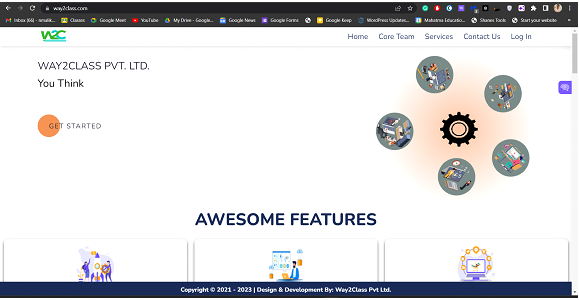
Selenium is a well-known open source, web-based automation tool used by many people. But sometimes it has problems interacting with certain elements; perhaps an unexpected popup prevents the web driver from performing its actions and generates incorrect results. This is where JavascriptExecutor plays a key role in this scenario, enabling the web driver to successfully perform the required operations. Its complexity and suddenness make it easier to deal with the situation.
Using an interface called JavascriptExecutor, you can execute JavaScript through Selenium and interact with HTML in the browser when using this programming language. You must use JavascriptExecutor objects to create sentence structures of varying length and complexity for composition Engaging text is crucial. Thus, the JavaScript Executor provides a means to communicate with HTML within a web browser, while also enabling programmers to use their own unique JavaScript writing style to build clever and flexible expressions.
The following are the methods provided by JavascriptExecutor in Selenium:
The Chinese translation ofExecuting JavaScript in the presently chosen window or frame has never been so easy! By calling an anonymous function, this enables method users to reap the rewards of a multitude of data types, including −
Web Elements
Lists
Strings
Long
Boolean value
ExecuteAsyncScript
Asynchronous JavaScript execution is a multi-threaded approach to execute individual JavaScript tasks in the current window or frame. It allows page parsing to continue, optimizing performance and providing great flexibility. Breaking down the code into easily identifiable components with varying complexity and context is key to achieving this objective. This approach involves creating concise segments in some areas while accommodating lengthier and intricate sections in other parts. With this method, the asynchronous JavaScript is run in an efficient and optimized manner.
Step 1 - Import package
import org.openqa.selenium.JavascriptExecutor;
Step 2 - Create a reference
javascriptExecutor js = (JavascriptExecutor) driver;
Step 3 - Call JavascriptExecutor method
js.executeScript(script, args);
// importing the package Import org.openqa.selenium.JavascriptExecutor; // creating a reference JavascriptExecutor js = (JavascriptExecutor) driver; // calling the method js.executeScript(script, args);
Refresh the browser window.
JavascriptExecutor js = (JavascriptExecutor) driver;
js.executeScript("location.reload()");
To send the text.
JavascriptExecutor js = (JavascriptExecutor) driver;
js.executeScript("document.getElementByID(‘element id ’).value = ‘xyz’;");
Generate warning pop-up window.
JavascriptExecutor js = (JavascriptExecutor)driver;
Js.executeScript("alert(‘hello world’);");
To get the Inner text of a web page.
avascriptExecutor js = (JavascriptExecutor)driver;
string sText = js.executeScript("return document.documentElement.innerText;").toString();
To get the title of the web page.
avascriptExecutor js = (JavascriptExecutor)driver;
string sText = js.executeScript("return document.title;").toString();
Scroll the page.
JavascriptExecutor js = (JavascriptExecutor)driver;
//Vertical scroll – down by 150 pixels
js.executeScript("window.scrollBy(0,150)");
In this example, we use selenium web driver and javascriptExecutor to open the WaytoClass website and click on an element.
The following mentioned script will launch edge browser, take you to the WaytoClass website, and use javascriptExecutor to click a certain element. So, let’s check how it functions.
Create an edge driver class and provide the path of youredgedriver.exe in the system property "webdriver.edge.driver".
Maximize the window by using driver.manage().window().maximize()
Use driver.get("URL link") to open the URL
Use the finddby xpath method to get the Java element "driver.findElement(By.xpath("xpath address"));"
Create a reference for javascriptExecutor by using javascriptExecutor js=(javascriptExecutor) driver;"
Call the javascriptExecutor method and pass the web page element to be clicked "js.executeScript("arguments[0].click();",webelement);"
import org.openqa.selenium.By;
import org.openqa.selenium.JavascriptExecutor;
import org.openqa.selenium.WebDriver;
import org.openqa.selenium.WebElement;
import org.openqa.selenium.edge.EdgeDriver;
public class waytoclass {
public static void main(String args[]) {
System.setProperty(
"webdriver.edge.driver",
"C:\Users\ADMIN\Documents\Selenium\msedgedriver.exe");
// Instantiate a Driver class.
WebDriver driver = new EdgeDriver();
// Maximize the browser
driver.manage().window().maximize();
// Launch Website
driver.get("https://www.waytoclass.com/");
WebElement java = driver.findElement(
By.xpath("//*[@id="hslider"]/li[6]/a"));
// Create a reference
JavascriptExecutor js = (JavascriptExecutor)driver;
// Call the JavascriptExecutor methods
js.executeScript("arguments[0].click();", java);
}
}
Starting MSEdgeDriver 98.0.1108.56 (9a336a18ae89157b3c7ea0568a9cbced8ebc3f7) on port 55401 Only local connections are allowed. Please see https://chromedriver.chromium.org/security-considerations for suggestions on keeping MSEdgeDriver safe. MSEdgeDriver was started successfully.
NOTE - After showing the above output, it will automatically open the website and click on the element.

Enhancing automation capabilities on the web is made possible through the use of JavascriptExecutor allowing developers to engage with page elements beyond what is ordinarily feasible using Selenium. Moreover, with a higher degree of flexibility and customization added to the equation web automation can be greatly improved in terms of speed and efficiency. Despite its complexity for inexperienced coders who are not versed in the intricacies of JavaScript, mastering this language can enable organizations which strive towards advancing their internet persona.
The above is the detailed content of JavascriptExecutor in Selenium. For more information, please follow other related articles on the PHP Chinese website!




